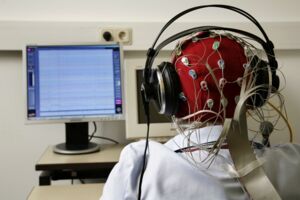Welcome to the Dortmund Vital Study on healthy cognitive aging!
The Dortmund Vital Study (DVS) is a longitudinal, population-based cohort study on determinants and consequences of cognitive aging.
The DVS aims to identify influences of biological, lifestyle and environmental factors on physical and mental health across the lifespan and to develop new possibilities for early detection of cognitive decline in aging. The study will shed light on sources of interindividual differences in the alterations of cognitive functioning with increasing age and reveal biological and lifestyle markers contributing to work ability, longevity, and healthy aging. A special focus is on the influences of work and work activity. But also risk factors for cognitive decline, mild cognitive impairment, or even dementia will be evaluated.
The DVS is a multidisciplinary study of the Leibniz Research Centre for Working Environment and Human Factors at the Technical University of Dortmund (IfADo) in Germany, involving the Departments of Ergonomics, Immunology, Psychology and Neurosciences, and Toxicology, as well as numerous national and international collaboration partners.
The study has been registered at Clinicaltrials.gov NCT05155397 and a study protocol of the DVS has been published in JMIR Research Protocols.
You are a scientist and interested in the DVS? Do you have questions about the methodology or the collected data? You would like to realize a scientific project with the DVS data? Here you will find answers to your questions or contact us directly: dvs@ifado.de.
Recent articles

The present study aims to clarify whether physical fitness is basically related to cognition and general intelligence in healthy adults, and whether higher levels of fitness are associated with better performance in the same cognitive functions in younger and older adults (Gajewski et al. 2023).

In the present study, we systematically evaluated two different approaches to latency estimation (peak latencies and fractional area latencies) and the application of noise reduction by jackknifing methods. (Wascher et al. 2022)

Alzheimer’s disease manifests with spatial disorientation in adults at genetic risk (APOE ε4). Here we examined spatial orientation performance during a virtual navigation task in risk carriers, and found deficits decades before potential disease onset. (Bierbrauer et al. 2020)

We studied the effects of auditory distraction on time perception and found that involuntary distraction due to a deviant event led to a withdrawal of attentional resources from the processing of time information. (Getzmann et al. 2022)